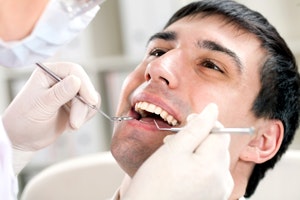A guide to wisdom teeth

What are wisdom teeth?
Normally wisdom teeth appear when you are between 17 and 25 but sometimes they come later. Generally, adults have between 28 and 32 teeth but sometimes a person’s jaw can be too small to accommodate all the teeth so this is why wisdom teeth don’t always come through properly. Not everybody experiences problems with wisdom teeth and often they come through with no issues.
What problems can you get?
Problems such as pericoronitis can occur – this is when the wisdom tooth appears through the gum but some of it still remains covered. This can result in sore and swollen gums and can become painful to clean. This tends to be a temporary problem and can be treated with mouthwashes and antibiotics if it’s particularly painful.
What does having an impacted wisdom tooth mean?
This is when there is no room in the mouth for the wisdom tooth to come through and it will get stuck against the tooth in front of it. Usually, the wisdom tooth will grow at an angle and this is when it’s described as impacted. If the problem can’t be rectified, then the best course of action is to have the wisdom tooth removed.
Is removing wisdom teeth difficult?
This largely depends on the position and the shape of the roots. An x-ray will show how difficult it is likely to be and in particularly awkward cases, you may need to be referred to a specialist oral surgeon at a dental hospital. Most wisdom teeth cases are fairly straightforward and can be dealt with by your dentist. Local anaesthetic or sedation would be recommended for the procedure. If you need to go to a dental hospital, then a general anaesthetic may be used.
Will I experience pain after the wisdom tooth is removed?
The level of discomfort will largely depend on how easy it was to remove it. Generally, there will be some swelling and discomfort for a few days afterwards. Using mouthwashes will assist with this and painkillers such as paracetamol or ibuprofen will help as well. In some cases, you may need some stitches to help the gum heal and in these instances, it is usual for your dentist to see you again about a week later to check the progress of your healing and remove any stitches. Avoiding alcohol and smoking is recommended for 24 hours after any treatment.
For more advice about the treatment of wisdom teeth, please contact us now.
Call us now to make an appointment

Keep reading...
What can you drink during your Invisalign treatment
One of the rules of the treatment that patients often struggle with is the water rule. While you are wearing…
Top 6 things to know before starting Invisalign treatment
In this guide, we’re sharing six things we wish all patients knew before starting treatment. This could help you to…
How Much Does Invisalign Cost in the UK?
Instead of fixed braces, you wear a series of clear plastic aligners. These aligners apply gentle pressure to your teeth…
Does Invisalign Work? Pros, Cons, Effectiveness
Another popular method for straightening your teeth is Invisalign. This system was inspired by the clear plastic aligners that are…

Hear from our
happy patients
These are just some of the kind words about our practice, direct from our incredible patients.









